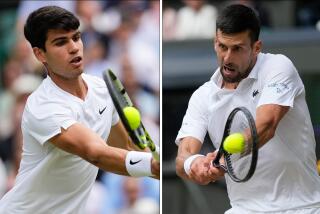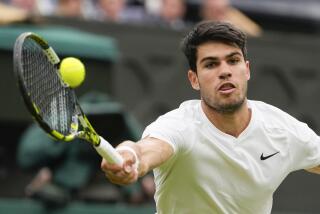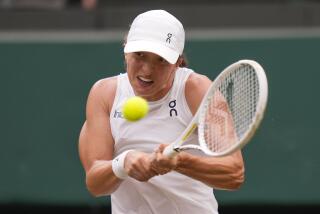Soviets Begin to Take Interest in Tennis With Olympics Coming Up
- Share via
LONDON — Struggling for more than a decade against top-notch international competition, Soviet tennis players of quality suddenly are emerging as the sport returns to the Olympics after 64 years.
Soviet authorities are making great strides to close the gap between their own low-ranking players and the stars of East-bloc neighbor Czechoslovakia and the West.
For the first time since the mid-1970s, two Soviet players reached the fourth round of the men’s and women’s singles this year at Wimbledon, and one of them went on to win the junior event for the second straight year.
Two other Soviets eliminated the defending women’s doubles champions, Martina Navratilova and Pam Shriver, widely regarded as one of the best partnerships of all time.
Soviet officials say these performances at the world’s premier grass-court tournament reflect the progress made in trying to improve the level of the game in their country, where soccer and basketball traditionally attract far more interest.
“Before tennis came back in the Olympic Games, there was not that much interest,” said Viktor Yanchuk, general secretary of the Soviet Tennis Federation.
“Our top players would only appear at maybe eight to 10 international tournaments a year. Now, they are starting to go to between 15 to 20, gaining experience by meeting players stronger than themselves,” he said.
The decision to open the Olympic door to tennis professionals and allow them to compete for medals was made in May at a session of the International Olympic Committee in Istanbul, Turkey.
Tennis was an exhibition sport under severe age restrictions on professionals at Los Angeles in 1984, when Stefan Edberg of Sweden and West Germany’s Steffi Graf won the men’s and women’s singles titles.
But the ruling to give it the same status as the other Olympic sports immediately boosted interest in the Soviet Union, which for years has been lagging behind in producing high-caliber tennis players.
For the first time, Soviet television sent a commentator to Wimbledon last month to cover the two-week tournament.
The move could not have been better timed as Alexandr Volkov became the first Soviet man to reach the fourth round since Alex Metreveli in 1975, and Natalia Zvereva reached the same stage of the women’s event, the first Soviet to do so since Olga Morozova in 1976.
Volkov, a qualifier who had never won a Grand Prix match and was ranked 503rd in the world, upset America’s 12th-seeded Brad Gilbert on his way to the round of 16, where he lost in four sets to Anders Jarryd of Sweden.
Zvereva, a 16-year-old from Minsk, brought to Wimbledon a two-fisted backhand and an uninhibited zest for the game that endeared her to the Centre Court crowd. She also knocked out a seeded American, No. 10 Lori McNeil, on her way to the fourth round.
There, Zvereva had the world’s seventh-ranked player, Argentina’s Gabriela Sabatini, in deep trouble in the middle of the match, especially with lobs and drop shots.
As her opponent became too impetuous, Sabatini eventually came through, 6-0, 2-6, 6-4, but Zvereva’s performance filled the Wimbledon interview room almost to capacity with reporters.
“I try to play a little like Chris (Evert) and a little like Martina (Navratilova),” Zvereva said in halting English. “I was so happy to play on Centre Court, but if I had to choose between Wimbledon and the Olympics, I think I would choose the Olympics.”
Zvereva, who was highly praised by Sabatini, went on to retain her title in the junior event, while Svetlana Parkhomenko and Larissa Savchenko upset Navratilova and Shriver in straight sets in the quarterfinals of the women’s doubles.
The two Soviets lost in the semifinals to the eventual winners, Claudia Kohde-Kilsch and Helena Sukova.
The Soviet successes at Wimbledon after such a long absence were welcomed by other players.
“It’s great seeing them back,” said American Tim Mayotte, a three-time quarterfinalist but knocked out this year in the third round. “It balances out the circuit. It makes tennis even more appealing because it’s already the most international of games.”
Yanchuk said the performances of his players at Wimbledon was a big boost for Olympic preparation and indicated another Metreveli-Morozova era could be on the way.
“We had no success for years after Metreveli and Morozova because the door was shut on other young players,” Yanchuk said.
“Preparations then began for the (1982) Moscow Olympics and tennis got pushed into the background. Because it is not so popular in our country as, say, in America or Australia, it was not so easy for us to prepare strong players.”
Once tennis returned at the Los Angeles Games, Yanchuk said, interest in the game immediately rose in his country.
More to Read
Go beyond the scoreboard
Get the latest on L.A.'s teams in the daily Sports Report newsletter.
You may occasionally receive promotional content from the Los Angeles Times.






